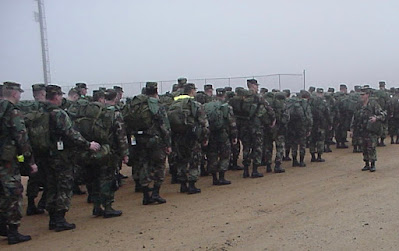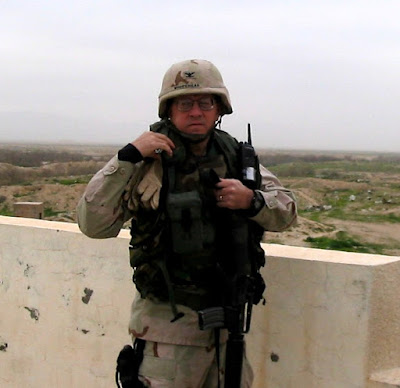On the evening of October 14th I was sitting in my living room thinking about going to bed soon. It was 9:30. I glanced at my Red Cross phone and saw a text from my boss:
“We have to write an advance operational plan before we go to bed tonight.”
My job at Red Cross National Headquarters is to write Red Cross deployment plans for large operations. I don’t normally have to do this on such short notice. And 10:30 is my normal bed time. Adrenalin would keep me awake for the next 3 hours.
 |
I spent two days helping to open one of the two congregate shelters in Anchorage
to house the incoming evacuees. |
The week prior a typhoon struck western Alaska and severely impacted three native Alaskan villages. These villagers lived in traditional societies in which they hunted and fished over the summer and then ate what they had stored through the winter. The storm surge and wind damaged or destroyed many of their homes, as well as the supplies they needed to survive over the winter.
No government can make any citizen evacuate when they do not want to. In Florida, where I worked many hurricane disasters, people who needed to evacuate wouldn’t leave and people who didn’t need to evacuate would. The native Alaskans decided that they needed to evacuate and requested assistance.
The state of Alaska decided to fly the people who wanted to leave to Anchorage where they could be cared for. The state of Alaska asked the Red Cross to assist in caring for these evacuees in Anchorage. The request from the state took several hours to be translated into a text message that ended on my Red Cross phone.
I went to my office in my house to call my boss to ask him what was going on. His phone was busy, of course. I’ve done many of these plans, so I pulled up the template and began preparing to write the plan when I got the necessary information.
When my boss called, I was ready. He told me that we needed to resource a disaster relief operation in Anchorage that could shelter 2000 people at two locations. I started writing the plan and when I finished, I asked if I could go to Anchorage to support the operation
He told me yes.
At noon the next day I was at Dulles airport for a 2 1/2 hour flight to Minneapolis and then a six hour flight to Anchorage. Flying from the East Coast to Anchorage is like trying to fly to Frankfurt. Germany. Takes a long time.
I arrived in Anchorage at 6:30 PM. This was 10:30 PM Eastern time and I was already having to adjust my bedtime two days in a row. I got the opportunity to go to the first shelter that had been established at the University of Alaska in Anchorage.
The next morning, I reported to work to do my job of writing plans for the next day for the disaster relief operation. My plans were changed when we were told that a second plane load of native Alaskans was due to arrive in several hours in Anchorage and we needed to go to the Egan Convention & Civic Center downtown and help establish a second shelter.
As they say in the Red Cross, everyone is a shelter worker. Everything in Anchorage, I discovered, is 15 minutes away by vehicle. I parked on the street next to a meter and returned eight hours later to find that I had a parking ticket. A week later I called the city of Anchorage, begged forgiveness, and they gave it to me.
I was one of the first people to arrive at the Egan center. We were expecting 200 evacuees in several hours. Fortunately for the evacuees and the American Red Cross, a highly experienced shelter manager was coming to supervise me and the other Red Cross people who were arriving at the shelter. I have worked in many shelters before but never had to establish such a large shelter under such a tight deadline.
A lot of resources - cots, shelter workers, snacks, medical staff - were heading for the Egan Center and I wondered whether the evacuees would get there first. Our shelter manager knew what to do. We toured the building with the facility manager and came up with a plan. All of the bathrooms were on the bottom floor so we decided to make those conference rooms the dormitory, or sleeping area.
We would guide the evacuees off the buses when they arrived to a large conference room on the first floor where we had tables, chairs, drinks and snacks. When the cots were set up in the dormitory we would direct them downstairs.
Dozens of local volunteers arrived to help set up the cots. Only, the cots were on a truck and heading our way. When will the the cots arrive? I asked over my cell phone. “Soon,” I was told.
The buses arrived in front of the Center and the evacuees poured into the first floor. We were there to direct them to the nice dining area we had set up, where they could sit down, relax, have a drink and some snacks. What we had not foreseen was that more than half of them were in urgent need of a bathroom.
Best laid plans. They had been on a C-17 flight from Bethel to Anchorage. At the airport they were immediately loaded on buses for the short trip to the Egan Center. Neither one of these conveyances had bathrooms.
Fortunately, in the middle of the first floor was an escalator to the ground floor and the bathrooms. For many of the evacuees this was a day of firsts. Their first trip on a C-17 transport plane then their first trip on an escalator. The escalator was so fascinating to the children that, in the subsequent days, we became concerned for their safety and had to post Red Cross volunteers to steer them away.
The next 4 hours I interviewed evacuee families and entered their information into the Red Cross shelter registration system. I sat at a desk near the dining area with the head of the household seated in front of me. As I entered the information into my Red Cross computer a line of native Alaskans formed, waiting their turn.
I finished the registration job as the night shift of Red Cross shelter workers arrived at the Egan Center. Several members arrived straight from the airport, their luggage in hand. As more volunteers flew in the next morning their were also sent to the Egan Center and University of Alaska shelters to staff the day shifts.
With the shelter established and staffed I returned to my regular job of preparing incident action plans for the headquarters. In the coming weeks I was able to assist in the planning to move the evacuees from their congregate shelters to hotels as well as our plan to assist with the distribution of emergency supplies to those individuals still remaining in the impacted communities in Western Alaska.
 |
| My work station at the relief operation headquarters where I helped prepare operational plans. |
This was another great Red Cross deployment for me in that I was able to work directly with the affected clients and I learned a lot that will help me with my job at national headquarters.
 |
| In my third week in Alaska I volunteered to help move the evacuees and their luggage from the congregate shelters to the hotel rooms that the State of Alaska contracted for them. |
















